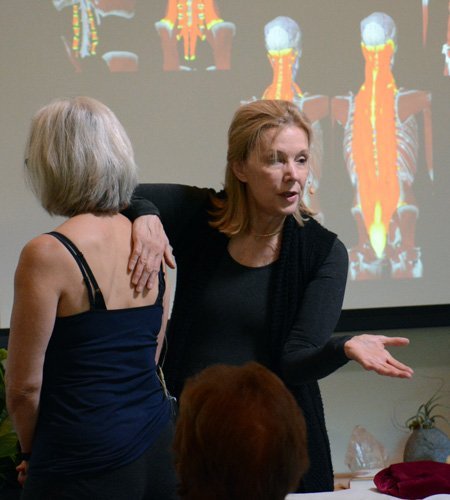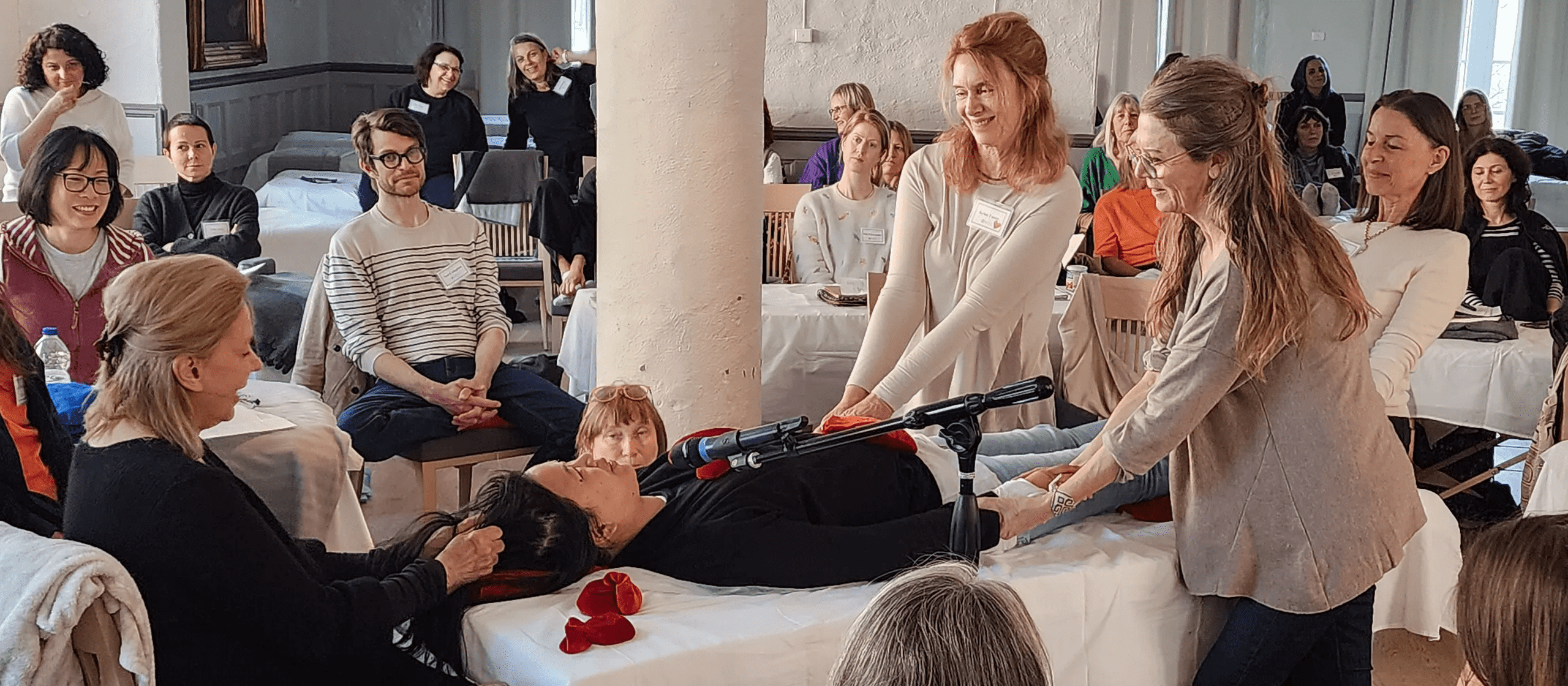
Become A NeuroAffective Touch® Practitioner
Bridge the Body-Mind Divide to Nurture Post-Trauma Growth
2024 Foundation Trainings
When the Mind Doesn’t Know What the Body Needs
Too many people with developmental trauma are facing a stalemate in their lives. As hard as they work on their mental health, at some point, they can go no further.
This is because their trauma is locked in the physical body, where unconscious bracing and tension keep their grief, fear, anger, and shame frozen in place.
As much as the body wants to let go of these painful patterns, it can’t because the mind doesn’t know how to address what the body so desperately needs.
Even if you have realized the body and mind are one, up until now, cultural and scientific beliefs in their separateness have limited our therapeutic approaches.
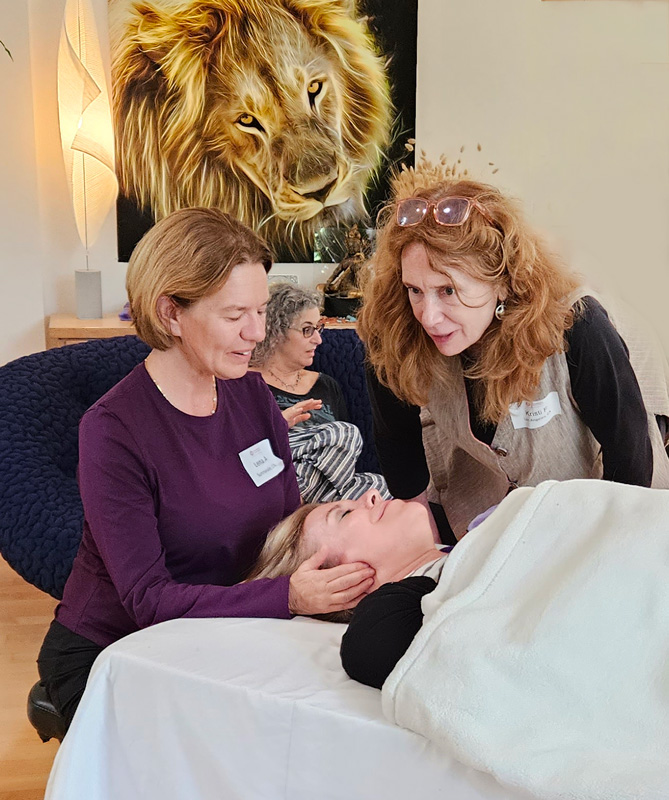
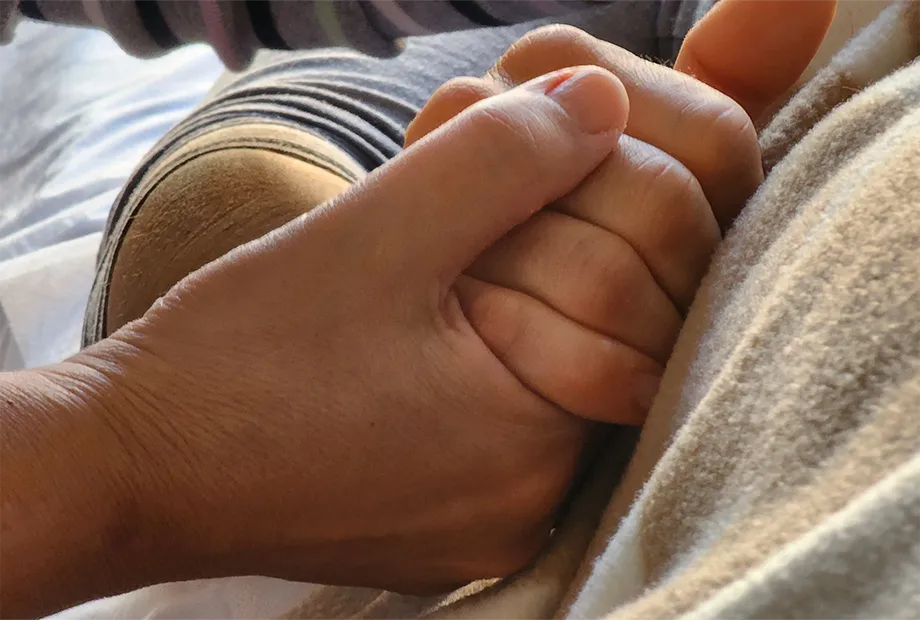
Break Through the Stalemate
Research now shows that healing early trauma requires an integrated body-mind approach.
If you are a therapist, body-centered practitioner, or healing professional, you should know it’s possible to break through the impasse your clients are facing by combining psychological skills and the therapeutic use of touch.
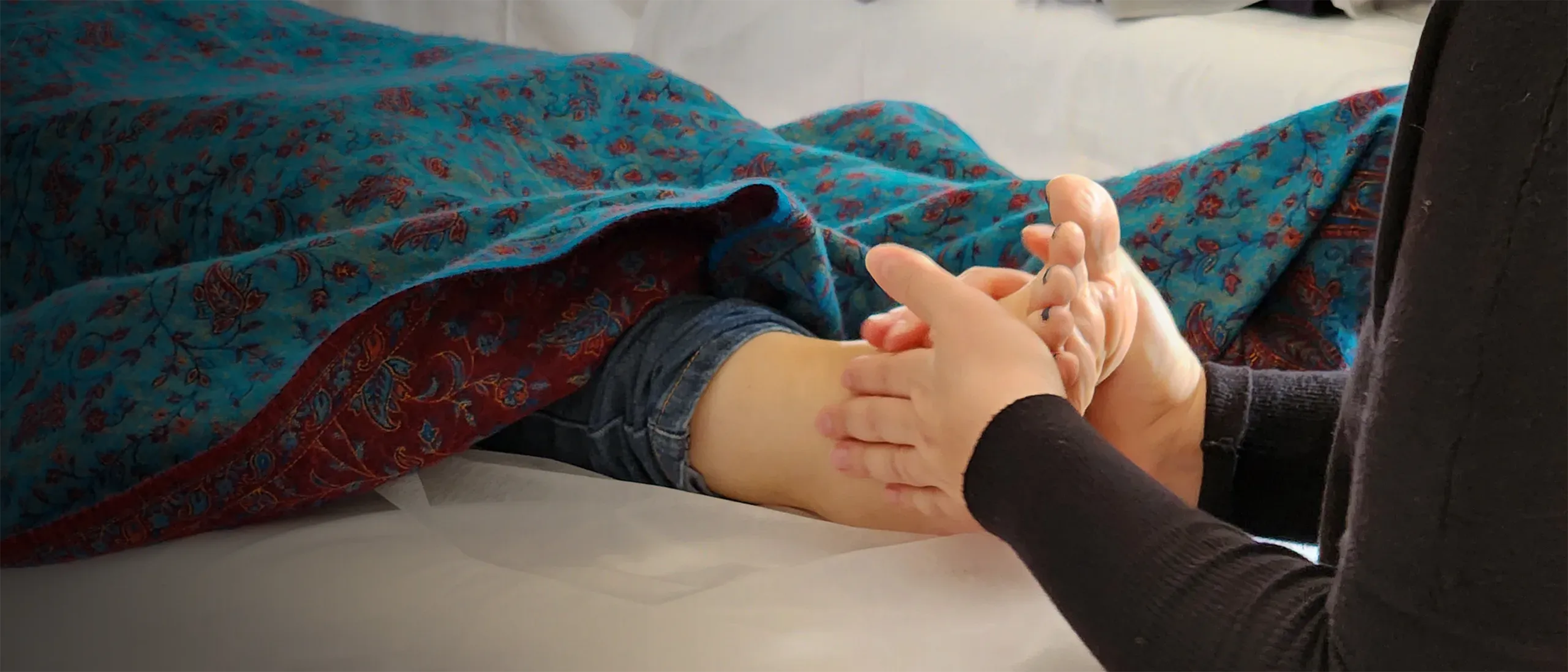
Bridge the Body-Mind Divide to Nurture Post-Trauma Growth
Years ago, looking for a way to bridge the body-mind divide, I undertook dual training as a psychotherapist and a bodyworker, which was rare at the time and is still relatively unusual.
As I interwove the two skill sets, I developed and refined NeuroAffective Touch®, a neurologically-informed approach integrating the disciplines of psychotherapy and the therapeutic use of touch, using somatic and body-centered knowledge for vital psychobiological interventions.
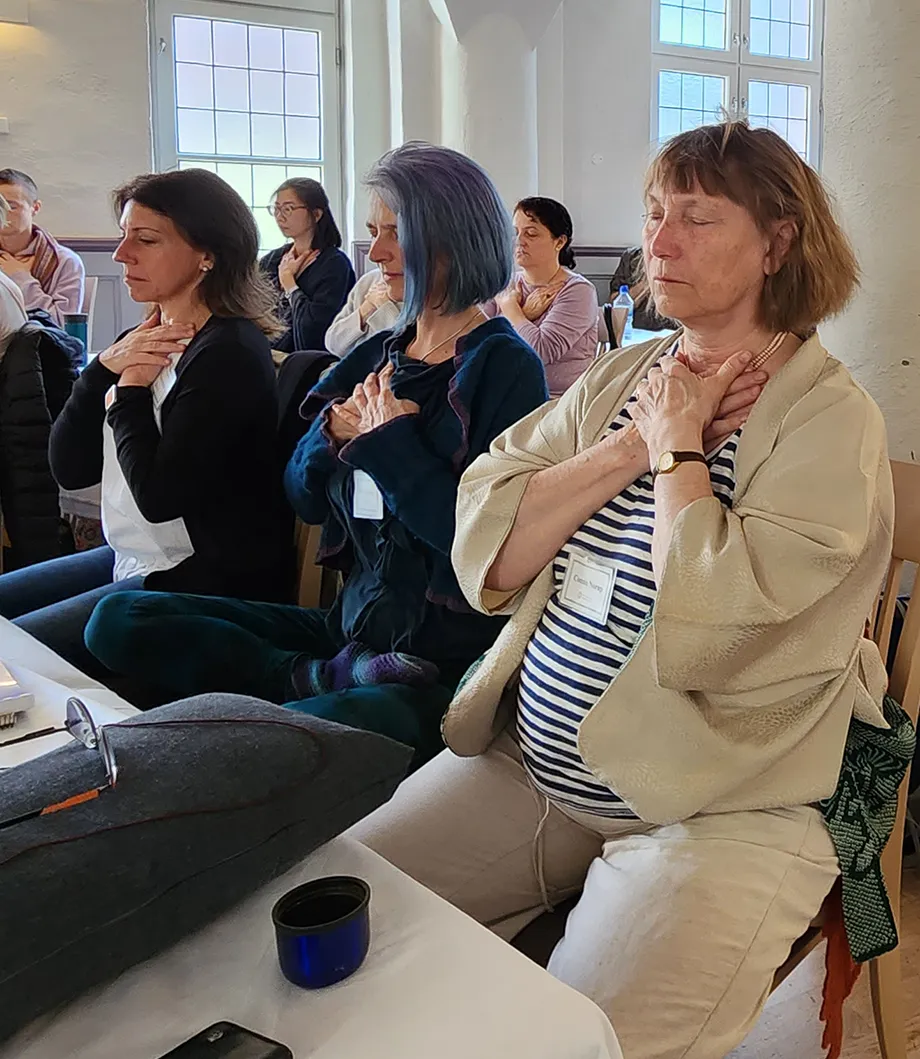
Develop Your Somatic Skills in the Foundation Training
I’m excited to offer the NeuroAffective Touch® Foundation Training to all healing arts professionals interested in supporting their clients with body-mind integration at the deepest level.
The training addresses the role of the body and its equal importance to the mind. Our focus is on emotional, relational, cognitive, and developmental challenges that can’t be resolved with talk therapy or bodywork alone.
What You Will Learn
The Foundation Training will open new possibilities for your clients and your career as you learn to…
- Offer your clients the missing pieces in their early development
- Provide tools that create real embodied hope for those who are anxious, depressed, or collapsed due to a history of misattunement, neglect, or abuse
- Resolve emotional and relational trauma
- And nurture resilient post-trauma growth as you guide your clients to deepen their relationship with their body’s intelligence
The training can be completed in either two 6-day in-person modules or a 4-module hybrid format combining online and in-person training.
I know it can feel risky to go in a new or innovative direction in your work, but I have trained hundreds of people to do precisely that, with exceptional results for their clients and careers.
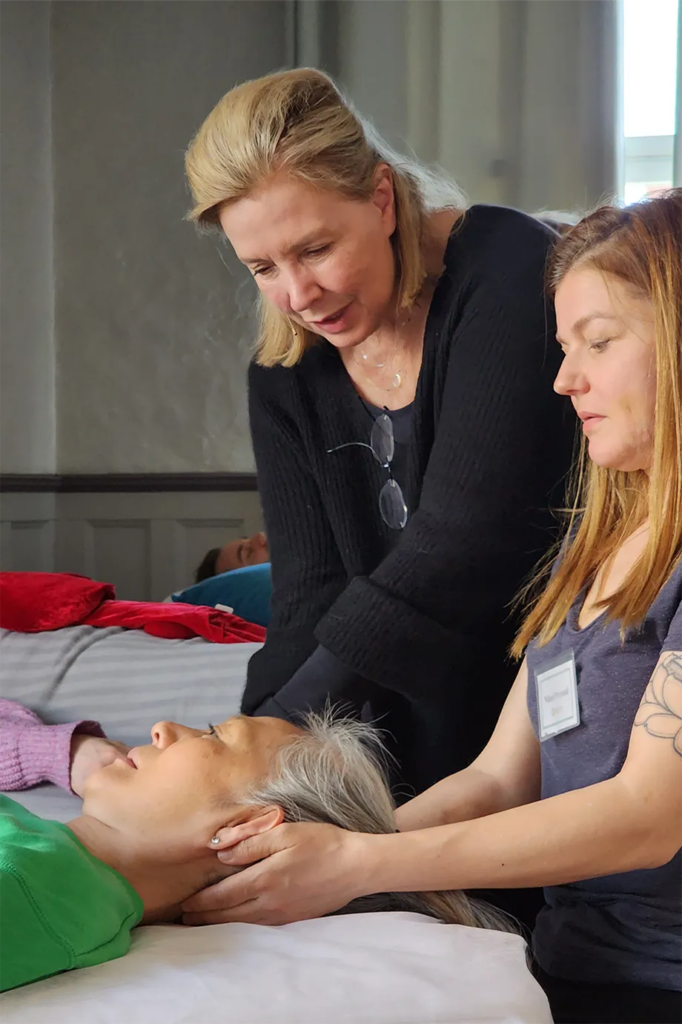
Become A NeuroAffective Touch® Practitioner
The Foundation Training includes…
- Step-by-step training in the building blocks of working somatically
- Demonstration sessions in real-time with detailed commentary
- Breakout practices and Q&As in each module
- Self-directed touch protocols and self-care guidance to provide a profoundly nurturing integration space for all you are learning in the modules
- Support to develop your own personal somatic practice, which will help position you to teach your clients how to work with their bodies therapeutically
- Ongoing access to our Online Learning Community, where you can ask questions and receive answers from moderators with long-term expertise in topics such as addiction, complex trauma, eating disorders, and couples work.
In addition, the hybrid online/in-person training includes…
- Exchange practice sessions with a practice partner from your cohort to apply what you are discovering in each module
- Three 2.5-hour Case Consultations led by me, where students have the opportunity to present cases that I break down and offer clinical guidance on, drawn from my 35 years of expertise.
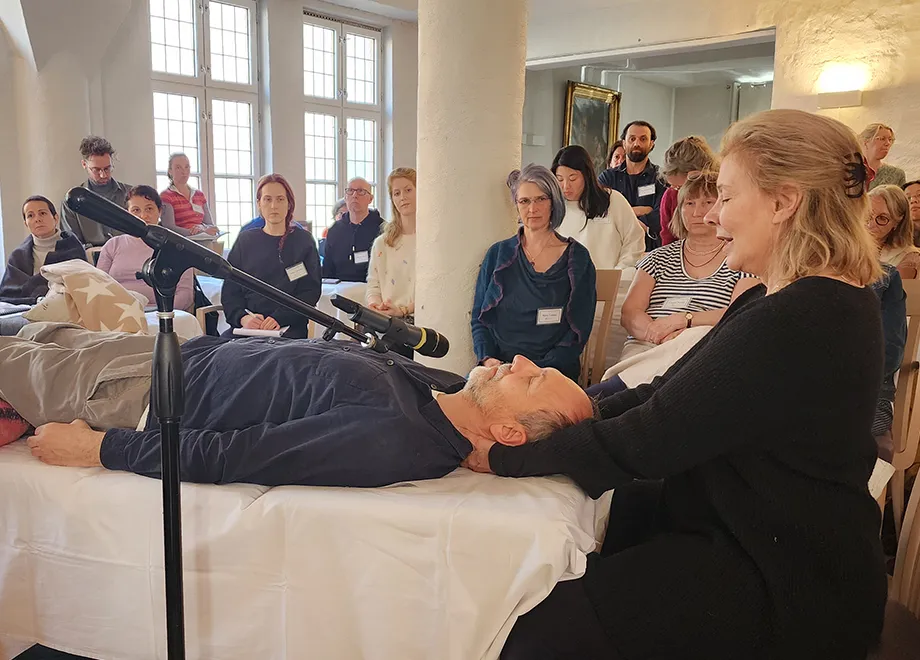
Who is Dr. Aline LaPierre?
Dr. Aline LaPierre, the creator of NeuroAffective Touch®, is a clinician, author, artist, consultant, speaker, and teacher, and was past faculty in the somatic doctoral program at Santa Barbara Graduate Institute (2000-2010). She is currently President of the United States Association of Body Psychotherapy and Editor-in-Chief of the International Body Psychotherapy Journal.
Dr. LaPierre co-authored the bestselling book Healing Developmental Trauma: How Trauma Affects Self-Regulation, Self-Image, and the Capacity for Relationship, available in 14 languages.
In the field of psychotherapy, she is a graduate of Pacifica Graduate Institute and The New Center for Psychoanalysis.
In the field of somatics, she has studied Somatic Experiencing®, Postural Integration, Cranio-Sacral Therapy, Reichian Therapies, Bodynamics Analysis, Continuum, BodyMind Centering, and EMDR.
A Groundbreaking Somatic Program
The training is nuanced, comprehensive, and groundbreaking, going beyond the psychotherapy trainings and bodywork programs available today to offer a truly integrated body-mind approach.
Our students frequently refer to NeuroAffective Touch as finding the “missing piece” that allows them to weave all their previous trainings into a seamless whole.
The training modules build sequentially, beginning with a deep dive into the psychobiology of touch and how to use touch in a way that allows the body to lead, rather than “doing to” the body.
This orientation supports the body to tell its story, which is often very different from the mind’s narrative.
Psychotherapists in the training will discover how to use language in a somatic way that invites the body to reveal its story and to finally be listened to and witnessed.
Bodyworkers will expand their psychological skills through body-mind collaborative languaging that supports the cognitive integration of changes in bodily states.
In the training modules, you will learn…
- How to work somatically with early developmental states, bringing healing to the deepest core of the self
- How to navigate, touch, and support the emotional body (also known as the dorsal vagal system), releasing the impact of emotional shocks and shifting the body and mind toward states of emotional regulation
- How to renegotiate states of hypervigilance clients face, resetting the social engagement system
- How to recognize positive autonomic shifts, the expansive movement of post-trauma growth, and indicators of the emerging self as revealed in imagery, sound, gesture, and posture
- And how to reconnect clients with their relational blueprint, repair ruptures in their developmental progression, and bring their body-mind into wholeness
Throughout the program, you will receive training in body-centered techniques to work bottom-up with implicit procedural behavior, posture, and movement, as well as top-down with trauma-based thoughts, beliefs, and identifications, fostering multidimensional growth and expansion for the people you work with.
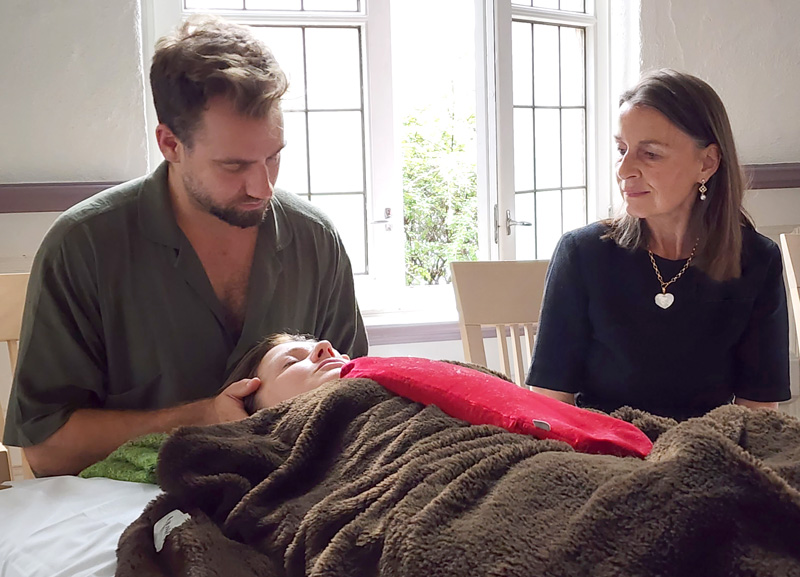
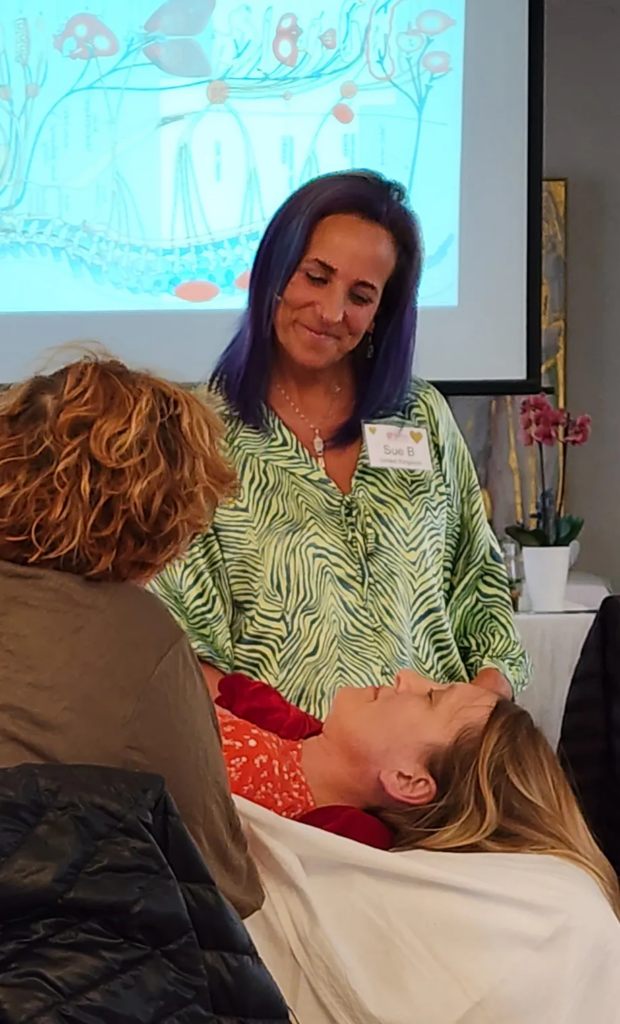
Offer Your Clients Deep Transformation and Advance Your Practice
Whatever your treatment goals are, NeuroAffective Touch can enhance your practice with leading-edge somatic skills that deepen your capacity to meet your clients.
You can generate forward momentum to break through stalemates they have been facing.
You can allow their bodies to safely share the story of their struggles to love and be loved, and enable their minds to grow new neural pathways and open up new possibilities for the whole person.
And you can ultimately nurture the greater expansion and unfolding of their unique human potential.
Join us to offer deep transformation to your clients and advance your practice with this groundbreaking somatic approach.
FAQ
Who can benefit from the Foundation Training?
The training is for you if you’re a counselor, psychotherapist, psychologist, social worker, marriage & family therapist, or pre-licensed intern or student in these fields, or if you’re an addiction counselor, psychiatrist, coach, certified massage therapist, bodyworker, nurse, health practitioner, or other professional who wishes to integrate body and mind in the resolution of trauma.
We ask you to complete a short application upon registration that allows us to know you and ensure that the training will be a good fit. If we determine the training is not a good fit for you, you will receive a full refund of any tuition deposit made.
How is the training structured?
We offer two options, and you can choose which format suits you and your schedule.
The first option is to attend two, 6-day in-person modules with me at my home in Los Angeles, California or in London, England.
The second option is to attend a 4-module hybrid format that combines three, 3-day online trainings and one, 5-day in-person training with me which, in 2024, will be held in St. Louis, Missouri.
Read all the details here on our Training Calendar and choose your preferred training. For the London training, please enroll here.
What is the scientific basis for this program?
Our training draws on more than 40 years of scientific research and literature on the role of touch in human psychology, biology, and behavior, including:
Bainbridge Cohen, B. (1993). Sensing, feeling, and action. Northampton, MA: Contact Editions.
Bowlby, J. (1988). A secure base: Clinical applications of attachment theory. Abingdon, UK: Routledge.
Caldwell, C. (1997). Getting in touch. Wheaton, Il: Quest Books.
Caplan, M. (1998). Untouched: The need for genuine affection in an impersonal world. Prescott, AZ: Hohm Press.
Chaitow, L. (1997). Palpation skills. New York: Churchill Livingstone.
Craig, A.D. (2015). How do you feel? An interoceptive moment with your neurobiological self. Princeton, NJ: Princeton University Press.
Critchley, H.D., & Nagai, Y. (2012). How emotions are shaped by bodily states. Emotion Review, 4(2), 163–168.
Damasio, A.R. (1999). The feeling of what happens: Body and emotion in the making of consciousness. New York: Harvest Books.
Field T. (1995). Touch in early development. Mahwah, NJ: Lawrence Erlbaum Associates.
Krieger, D. (1986). Therapeutic touch. New York: Prentice Hall Press.
Leboyer, F. (1987). Loving Hands: The traditional art of baby massage. London: Collins.
McGlone, F., Wessberg, J., & Olausson, H. (2014). Discriminative and affective touch: Sensing and feeling. Neuron, 82(4), 737-755.
Montague, A. (1971). Touching; The human significance of the skin. New York: Columbia University Press.
Nathan, B. (1999). Touch and emotion in manual therapy. New York: Churchill Livingstone.
Olausson, H., Lamarre, Y., Backlund, H., Morin, C., Wallin, B. G., Starck, G., Ekholm, S., Strigo, I., Worsley, K., Vallbo, Å. B., & Bushnell, M. C. (2002). Unmyelinated tactile afferents signal touch and project to insular cortex. Nature Neuroscience, 5(9), 900-904.
Overly, R. (1994/2004). Dr. Eva Reich’s butterfly touch massage. Asheville, NC: Gentle Bio-Energetics Institute.
Panksepp, J. (1998). Affective neuroscience: The foundation of human and animal emotions. Oxford: Oxford University Press.
Phillips, J. (2002). Somatic tracking and the ethical use of touch. The USA Body Psychotherapy Journal, 1(2), 63-77.
Shaw, R. (1996). Towards integrating the body in psychotherapy. Changes: An International Journal of Psychology and Psychotherapy, 14(2) 117-120.
Schore, A. (2003). Affect regulation and the repair of the self. New York: W.W. Norton.
Sills, F. (2001). Craniosacral biodynamics. Berkeley: North Atlantic Books.
Swade, T. (2020). The touch taboo in psychotherapy and everyday life. New York: Routledge.
Yoshida, S., & Funato, H. (2021). Physical contact in parent-infant relationship and its effect on fostering a feeling of safety. Science, 24(7), 102721.
Do I get access to professional video recordings?
Yes! Students will receive links to all the video recordings of their training modules. The video links are active for 5 years from the end of your training, and can be revisited to deepen your integration of the training over time. For ease of viewing, video recording chapters are titled according to their content: lectures, demo sessions, practice debriefs, and Q&As.
What if I miss a module?
We understand that sometimes life gets in the way, so if you cannot attend a module at the time it is given, please connect with our student relations manager, Laura, whose email address is listed on our training overview page here.
How do I become a Certified NeuroAffective Touch Practitioner?
To receive full certification after completing an in-person or hybrid Foundation Training, we ask all students to do the following:
- Complete a short series of personal therapy sessions with a certified provider, to give your own nervous system the body-mind integration you are offering clients.
- Attend 8 live or pre-recorded Study Groups of your choice with Aline. Recent study groups have explored the use of NeuroAffective Touch to support healing around Dissociation, Shame, The Disappointed Self, The Throat Connection, Touching Our Emotions, and Essential Tools for Working with Fear.
- Complete a series of 4 individual or 8 small group case consultations, or a combination of the two, with an approved provider.
- Write a Case Study to illustrate how somatic therapy contributes to the process of healing and change. Aline holds a free Case Study Writing drop-in support group on the first Saturday of most months.
Upon fulfilling your certification requirements, you will receive an official NeuroAffective Touch Practitioner badge for display on your website and any marketing materials you wish to use it in. The Institute will also list you alongside this special designation of Certified NATouch Practitioner in our online Practitioner Directory at no charge.
More details about the certification process are available here.
What is the cancellation and refund policy?
If you cancel your registration at least 21 days prior to the training module, a full refund will be issued, less an $85 processing fee.
If you cancel a training within 20 days of its start date, a 60% refund will be made for that module’s tuition, less an $85 processing fee. If you have also paid tuition in advance for future training modules, a full refund will be issued to you for the tuition for those additional future training modules.
If the NeuroAffective Touch Institute needs to cancel a training module for any reason, we will issue you a full refund.
All requests for cancellation and/or refund must be submitted by email. A request for cancellation is officially granted once you receive an email confirmation of the cancellation.
Our complete sales and refund policies can be found here.










